PHOENIX — Kayla White was 12 years old that winter morning when her life was changed forever. On Jan. 2, 2009, White’s mother was killed by her father, becoming a victim of domestic violence.
“That’s when I heard my uncle say, ‘I don’t know how you’re going to tell Kayla your mom didn’t make it,'” White said. That was the moment she found out her mother had passed on.
White, 22 and Navajo Nation member, said she didn’t realize growing up she was seeing signs of domestic violence at home. Her older siblings, however, told White her father had been mentally and verbally abusive to their mother for years, even before she was born.
Domestic violence can be defined as, “violent or aggressive behavior within the home, typically involving the violent abuse of a spouse or partner,” according to Google’s definition. It can take many forms, including mental, emotional and physical abuse.
One in four women and one in seven men have experienced domestic violence in their lifetime, according to the Arizona Coalition to End Sexual and Domestic Violence and there is one group, that is more likely to encounter domestic violence than any other in the United States.
Native American women experience domestic violence at rates 50 percent higher than the national average, according to the ACESDV.
“Even just looking at my mom’s life insurance, the way she had things set up for my siblings and I, she knew something was going to happen to her,” White said.
She said her mother even tried to file for divorce, but her father wouldn’t let her leave.

Kayla White and her mother. (Photo courtesy of Kayla White)
Many factors can contribute to domestic violence, including family history, times of stress, and substance abuse, according to the Center for Disease Control and Prevention.
However, there are those who say the high rates of domestic violence on Native American reservations are due, primarily, to a lack of awareness.
Caroline Felicity Antone grew up as a member of the Tohono O’odham Nation in southern Arizona.
“I didn’t even know there was such a thing as domestic violence,” she said.
Antone left the reservation when she was just 14 years old because of the abuse she was experiencing at home. She eventually came back, and works there now as a counselor.
She said she did not return home until after she pursued treatment and began coping with her abuse in a healthy way, something Antone said is not the norm.
“Since our tribal members don’t know about counseling in general, it’s very difficult to get them into counseling,” Antone said. “The shame, the hurt, the destruction of their souls, some of them, they feel it’s their fault.”
The combination of lack of knowledge and resources can become deadly in domestic violence situations. On some reservations, the murder rate of Native women is 10 times higher on average, according to the National Coalition Against Domestic Violence.

Kayla White and her mother.
(Photo courtesy of Kayla White)
The Community Alliance Against Family Abuse, located in Apache Junction, is working to expand relief efforts to Native American domestic violence victims.
Dorian Townsend is the Executive Director of CAAFA and a domestic violence survivor herself.
“One of our big concentrations is specifically on better serving the tribal communities within our service territory,” she said. “We recognize one of the biggest barriers to service right now, is just access.”
In recent years, CAAFA has helped victims from six different tribes in southern Arizona. It has a comprehensive plan through 2020 to improve the accessibility and effectiveness of resources. For example, if someone in Casa Grande or Maricopa experiences sexual assault, they have to drive to either Mesa or Scottsdale to receive treatment.
Townsend said they hope to improve accessibility to help victims more easily.
“We recognize there are certain unique characteristics of each tribal nation,” Townsend said. “There’s the historical trauma, that each (tribe) has experienced at their own time, on top of the current trauma people are experiencing, and we try to be mindful of that.”
Townsend said CAAFA is currently working with law enforcement in Pinal County to make sure each tribal national has individualized domestic violence needs.
For White, it’s been a long road since her mother’s death.
“Back then it was like, ‘this thing happened, it’s going to ruin our family,'” she said. “But the way I see it now, is that (my mom’s passing) made us stronger.”
Although studies have shown that domestic violence increases during times of stress, the staff at CAAFA wants to emphasize violence is not a one-time act.
The National Domestic Violence Hotline is available at 1-800-799-SAFE (7233). Also, there are eight women’s shelters in the Phoenix-metro area readily available to accept and help those in need.